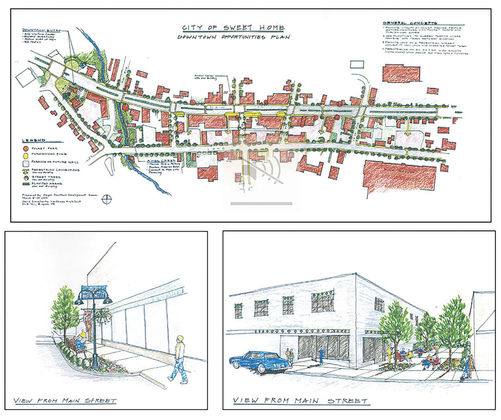By Benny Westcott
Of The New Era
The Sweet Home City Council reached a consensus Tuesday, May 24, regarding vacant commercial buildings downtown, planning a future discussion between their owners, city staff and administration, and the Finance and Property Committee.
According to Mayor Greg Mahler, four entities own 90% of the empty structures: Jeremy Totman, Andy Snegirev, La Mota and the Victors.
“Why are they not opening their minds and saying, ‘OK, let’s do something for our community’?” he said. “Here we’re trying to come up with trying to punish, or trying to do something to get our downtown viable again. But these individuals are holding up the game. And that’s the frustration. My thought is, you bring them to the table and find out what it would take for them to lease, sell or do something. We may find out that we may be able to help as a city to move it forward.”
Councilor Angelita Sanchez agreed that a meeting would be worthwhile.
“I think the first step is to meet with the owners of the properties and see what’s prohibiting them from upkeep or upgrade, and to see what they need from us,” she said.
Councilor Dave Trask looked forward to such a session, adding, “Will we get anywhere? We don’t know. But it would be nice to know what we can do to help them to make it easier.”
Mahler didn’t think the problem was a lack of demand for storefront space.
“It’s not that businesses are not out there to come to Sweet Home, because there are,” he said, detailing two “very lucrative” ones seeking a vacancy.
“They looked at every open building in town,” he recalled. “And the problem was the ones that were even willing to sell were asking two times the value of the building. They finally gave up and said, ‘I can’t come to Sweet Home because I can’t find a building in Sweet Home.’ But it’s weird because we have all of these empty buildings in town.”
Councilors discussed other options to address the issue.
The city’s current vacant-building ordinance, adopted in January 2021, requires owners in commercial and industrial zones to register properties and maintain them by weeding, landscaping, keeping roofs in good repair, removing graffiti promptly and keeping exterior walls, doors and windows sound. The ordinance also requires owners to secure and inspect buildings on a monthly basis and to have a local building manager.
However, as Community and Economic Development Director Blair Larsen said, “Just because a vacant property is registered does not mean it will soon or ever be occupied. Some owners seem willing to talk with the city about their property, but they don’t talk to any potential lessees. And registration does not mean it will look nice.”
He added that there were no current appearance standards for downtown.
Larsen also said the fact that the ordinance was put in place during the pandemic has had a negative impact on enforcement.
“There have been some hiccups in staffing during that time,” he said. “We do have some parts of our ordinance that we’re not actively enforcing as much as we could, and we definitely need to work on that.”
For example, he said, code enforcement hasn’t typically involved interior inspections. Some buildings may appear vacant, but are used for storage, which requires a conditional use permit in the downtown area, according to the Sweet Home Municipal Code.
Discussing other ways vacant buildings could be legislated, Larsen said that some cities have insurance requirements to protect neighboring properties from negative effects. He also noted that some Oregon municipalities impose sometimes-escalating fees on owners of vacant buildings. But he insisted that only so much could be done with regulation initiatives.
“If the goal is fully occupied properties, we’re not going to be able to regulate our way to that,” he said. “That depends too much on the market, demographics and our community having the draw that retailers want. And typically, that’s people, and preferably people that have plenty of extra money.”
Also, in light of Mahler’s assertion that only four entities owned 90% of the vacant commercial properties downtown, Larsen cautioned against installing sweeping rule changes.
“If there’s only a couple people that you have a problem with, changing the rules or adding regulations that cover everyone is probably not the best way to go about it,” he said. “It’s kind of like going after a fly with a sledgehammer. You can have a more surgical approach when it comes to just working the relationship.”
Larsen added that attempting to determine why owners aren’t filling properties with vibrant businesses doesn’t yield a one-size-fits-all answer.
“It’s similar to trying to find the reason why people are homeless,” he explained. “If you interview 10 people, you’re going to find 10 different reasons. Some might be looking for that tax shelter. Some are looking to eventually start a business and just haven’t done it yet, or their fortunes haven’t gone as well as they hoped they would.”
He suspected the state might not be of much assistance.
“Most of the available help that I’ve seen at the state end is focused on industrial-job creation and not commercial retail,” he said.
Larsen also noted the lack of “vanilla shells” in town, meaning potential retail spaces with an open space and bathroom that retailers can easily move into. He said that last year a local real estate agent and her husband toured nearly every single vacant building on Main and Long streets, ultimately ending at a different location.
“The conclusion they came to was that all the places they toured would have taken too much work to make it pencil out,” he said.
Trask lamented the situation.
“The unfortunate and sad part is there is not one of those buildings that has a ‘For Sale’ sign in it,” he said. “That’s disturbing to me. If you drive down Main Street in Lebanon, you don’t see very many empty buildings. So, they’re doing something that’s different than what we’re getting done here.”
“I am not a fan of any sort of enforcement,” Sanchez said. “I’m more a fan of enticing or incentives. As a business owner, I’m stretched thin. I have no time to do anything that I need to do, let alone things that people expect me to do.”
She suggested a downtown task force to remove old signs and be a “partner” instead of issuing tickets for citation.
“I think a lot of people are exhausted with the pandemic, and exhausted in their funds,” she said.
“We don’t want to necessarily penalize people,” Councilor Susan Coleman said, “but I think we should be enforcing our own codes.”
Gerson expressed disapproval of the situation.
“Economic development has been one of our top priorities forever,” she said. “But to me, it doesn’t seem to be getting anywhere, or it’s moving too slowly. I don’t have a solution, but I do think we have some ordinances that maybe we could look at. But I definitely do not think that we should have empty buildings for 12 to 15 years in a downtown area.”





